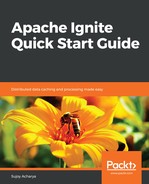Apache Ignite's key-value pair API is used to store objects in a cache and retrieve values using keys. Apache Ignite's query API lets us query objects using expressions. The ScanQuery API allows us to execute distributed queries over cache objects. We are going to create a cache, populate it with a collection of objects, and then use ScanQuery to retrieve them. Follow these steps to try out the ScanQuery API:
- Create a class, Player, with the following members:
public class Player implements Serializable {
private static final long serialVersionUID = 1L;
private Long id;
private String name;
private String team;
private double salary;
public Player(Long id, String name, String team, double salary) {
this.id = id;
this.name = name;
this.team = team;
this.salary = salary;
}
@Override
public String toString() {
return "Player [id=" + id + ", name=" + name + ", team=" + team +
", salary=" + salary + "]";
}
//Getters/setters here
}
- Add a class, ScanQueryTest, create a cache with the name Player_Scan_Cache, and populate it with some players:
IgniteConfiguration cfg = new IgniteConfiguration();
cfg.setPeerClassLoadingEnabled(true);
try (Ignite ignite = Ignition.start(cfg)) {
IgniteCache<Long, Player> playerCache =
Ignition.ignite().getOrCreateCache(PLAYER_SCAN_CACHE);
long id = 1l;
playerCache.put(id, new Player(id++, "Leo Messi",
"Barcelona", 996999995.00d));
playerCache.put(id, new Player(id++, "Christiano Ronaldo",
"Juventus", 2000000.00d));
playerCache.put(id, new Player(id++, "Paul Pogba",
"Manchester United", 1000000.00d));
playerCache.put(id, new Player(id++, "Neymar", "PSG",
99699999.00d));
playerCache.put(id, new Player(id++, "Luis Suárez",
"Barcelona", 578699.00d));
- Now, query the cache using ScanQuery. IgniteCache has a method to pass Query and it returns QueryCursor. ScanQuery is an implementation of Que
ry
; it takes IgniteBiPredicate as an argument. IgniteBiPredicate takes two parameters and returns aBoolean
. We are going to use a Java 8 lambda expression to represent IgniteBiPredicate. The i represents the key of the cache and p is the value or Player. Our IgniteBiPredicate returns true only if any player stored in the cache qualifies to the expression player.getTeam() EQ Barcelona. The result is returned as a QueryCursor; it stores all qualified entries (key-value pairs). We are going to use a Java 8 lambda to loop through the entries and print their details:
System.out.println("Barcelona Soccer Players");
QueryCursor<Entry<Long, Player>> barcelonaPlayersCursor =
playerCache
.query(new ScanQuery<Long, Player>((i, p) ->
p.getTeam().equalsIgnoreCase("Barcelona")));
barcelonaPlayersCursor.forEach(e -> {
System.out.println(e.getValue());
});
- Fetch all players who earn more than 1,000,000 USD . The query could be simple (i, p) -> p.getSalary() > 1000000:
System.out.println("Rich Soccer Players");
QueryCursor<Entry<Long, Player>> richPlayers = playerCache
.query(new ScanQuery<Long, Player>((i, p) -> p.getSalary() >
1000000));
richPlayers.forEach(e -> {
System.out.println(e.getValue());
});
When we run the previous program, it prints the following output:

The next section explores text-based full search.
